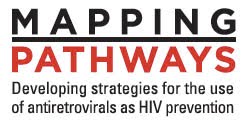Original content from our Mapping Pathways blog team
"The days of behaviourists, clinicians, scientists and legal policymakers being in separate rooms are over. We have to get into one room and work this problem out together."
 In the fourth of this five-part series, Linda-Gail
Bekker of the Desmond Tutu HIV Centre, a Mapping Pathways partner organisation,
speaks about her involvement in the HPTN 067 study and about issues that make HIV the complicated problem it is. Read parts one, two and three
In the fourth of this five-part series, Linda-Gail
Bekker of the Desmond Tutu HIV Centre, a Mapping Pathways partner organisation,
speaks about her involvement in the HPTN 067 study and about issues that make HIV the complicated problem it is. Read parts one, two and three
MP: What are some
of the other issues that make HIV the complicated problem that it is?
LGB: For 30
years, many people thought HIV was a behavioural issue only - that using
condoms, abstaining and being faithful would sort the whole problem out. On the
other hand, the biomedically thinking people scrambled around trying to find
something that worked, without a whole lot of success. Now the biomedical
protagonists have tools that work, such
as PrEP
and microbicides. The obvious mistake to be avoided at all cost would be to
throw the behavioural science out and go entirely with the biomedical tools.
This is a trap that medical people often fall into: (and I
am one of them!!) they love to fix things with pills and find it easier to
offer something tangible to a patient rather than wait for them to change their
behaviour. But pills and microbicides
will not work unless they get to the people that need them and those people have
the ability to take them. For example, if there’s a structural component in ones
life that is a barrier, such as a violent partner, ones ability to reduce one’s
risk may be compromised.
The days of behaviourists, clinicians, scientists and legal
policymakers being in separate rooms are over. We have to get into one room and
work this problem out together otherwise we may again end up with failure because
we’re not coming up with comprehensive solutions. After 30 years thinking about
a multi-sectoral approach seems the only way to go about it.
MP: Please tell
us a little about the ADAPT study that you are involved in.
LGB: The HIV
Prevention Trials Network (HPTN) is funding the ADAPT study, also known as HPTN 067, in three
sites. Cape Town, which I am PI of, is looking at women who have sex with men,
while Bangkok and Harlem are enrolling MSM.
My site has enrolled 180 at-risk women who have sex with men and we are in the
process of follow-ups with them.
The women are randomised to daily PrEP, intermittent PrEP
and event-driven PrEP using Truvada. The pills
are put into a ‘wise pill carrier’ and when it is opened to take a dose, a
signal goes to the server. Our staff
call up the young women weekly to discuss what happened over the week. It is an
intense study for the participants since they have to share intimate data with
site staff on a regular basis but the idea is to look at feasibility and
suitability to people of these various dosing modalities to see what works,
what doesn’t work, and what people can actually adhere to. It has really needed
committed participants and caring site staff with a great deal of trust between
them!
The primary goal is to discover if people can use the pills
the way they are meant to be used. There obviously are other issues like
looking at side effects, safety and other data but the primary end point is
feasibility and acceptability of a dosing strategy.
Linda-Gail
Bekker is deputy director of the Desmond Tutu HIV Centre at the Institute of
Infectious Disease and Molecular Medicine, University of Cape Town. She also
serves as the chief operating officer of the Desmond Tutu HIV Foundation, a
Mapping Pathways partner organisation.
Stay tuned to the blog as we bring you the final part of our conversation with Linda-Gail, where she speaks about her the importance of adherence, both in clinical trials and the real world, and the challenges and issues facing adolescents.
Stay tuned for the Mapping Pathways monograph, coming in early 2013
[Content that is linked from other sources is for informational purposes and should not construe a Mapping Pathways position. Please look for us on Facebook here www.facebook.com/MappingPathways and you can follow us on Twitter @mappingpathways as well.]

No comments:
Post a Comment